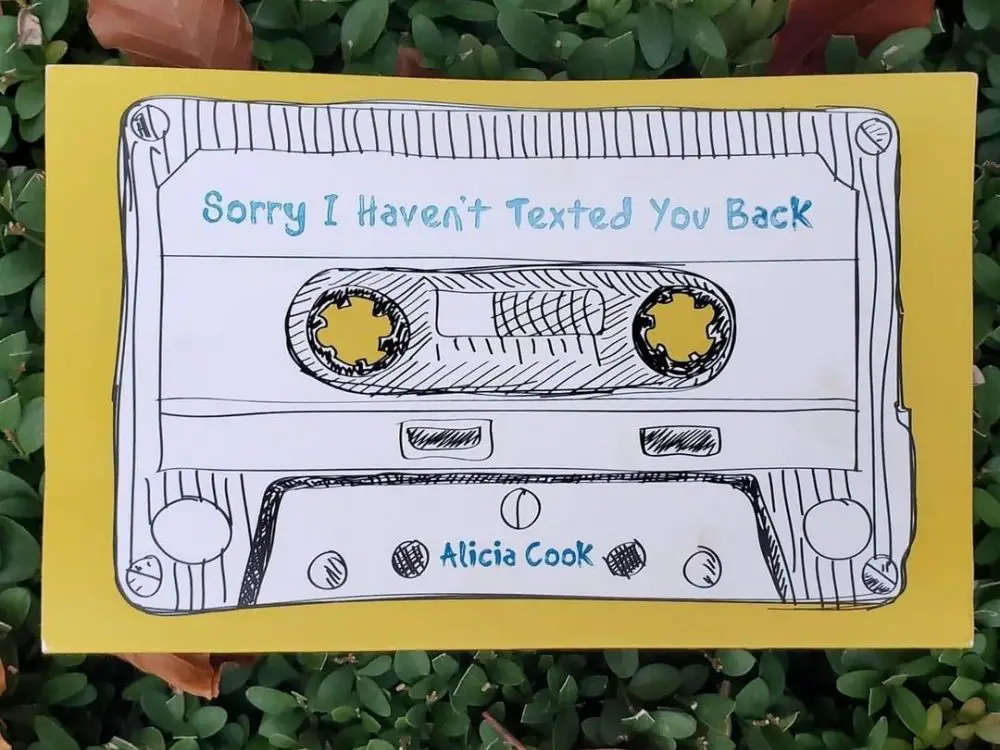The bestselling author and award-winning activist Alicia Cook is known for writing about vulnerable topics in creative ways. The poet’s bestselling books include “Stuff I’ve Been Feeling Lately,” “I Hope My Voice Doesn’t Skip” and her newest poetry collection, “Sorry I Haven’t Texted You Back.”
“Sorry I Haven’t Texted You Back” does an exemplary job of bringing awareness to those who struggle with mental health issues. The use of “I” in the title serves as an invitation to her authentic and transparent work, making it personal from the start. Her book encourages people to be more open in discussing and taking care of their mental health since it has a tremendous impact on their lives, especially their relationships. Those whose thoughts convince them they are alone in dealing with adversity can read Cook’s book and realize they aren’t.
The language Cook uses is blunt and filled with compassion. Her book incorporates creative elements like music to address universal themes such as love, grief, drugs, heartbreak, hope and restoration. It is unrelated to the emotional effects of the coronavirus, even though it was published during the pandemic when many of the subjects described were becoming more widely discussed.
Cook divides her book into two parts like a mixtape, where side A holds poems titled as “tracks” and side B holds “remixes” of the tracks. In side A, she doesn’t follow a strict structure. However, in side B, Cook leaves out words from the side A poems to create eerie blackout poems.
Every poem concludes with the title of a song for the reader to listen to and process whatever they are going through. Likewise, the visually appealing mixtape format along with the poetic techniques invites calm reflection and encourages open discussion for those experiencing low moments in their lives. In side B, the blackout poems either reflect a person’s dark mind dwelling on the negativity around them despite being so close to recovery, or they represent optimism and strength to recover.
The Intersection of Music and Poetry
“Sorry I Haven’t Texted You Back” includes a playlist of songs Cook listened to while writing the tracks. In an interview with Kara Lewis for readpoetry.com, Cook discussed how the songs intersected with her writing process. Cook added music to help readers feel at ease amid whatever mental illness or emotional distress they struggle with.
In “Track 53,” for example, the speaker believes the greatest gift they received was their loved one breaking their heart and leaving them, because it allowed them to finally heal from all the pain they were experiencing in the relationship. The speaker includes Selena Gomez’s song “Lose You To Love Me,” which alludes perfectly to the poem’s message.
The song tells a breakup story in which Gomez was stuck in an emotionally abusive relationship and had to gain strength and learn self-love by losing her partner and finally closing that chapter in her life.
Gomez’s lyrics, “I needed to lose you to find me / I needed to hate you to love me / I needed to lose you to love me,” fit nicely with Cook’s phrases, “You gave me the best gift. / You broke my heart. You left. And / you stayed gone. I want to thank you / for that.”
Since Cook knew Gomez’s song shared the same theme, she picked it to match her poem and give emotionally distressed readers a beautiful, soothing song to listen to while they read “Track 53.” The track encourages the reader to process their pain and heal from it by advising them to completely separate themselves from the source of their distress.
The Use of Poetic Techniques To Discuss Grave Issues
In “Track Six” from “Sorry I Haven’t Texted You Back,” the speaker figuratively tells depressed readers to “crawl out of their graves” before it is too late and not to give up hope. One of the hardest things in the world is living. Therefore, Cook urges readers to stay strong and tells them why they should not leave the world.
The poem is the book’s first sign of hope and motivation, and it inspires the following poems. It also supports the poet’s project by encouraging readers to explore the road to recovery rather than dwell on negative emotions.
Despite the vivid imagery used in “Track Six,” metaphors are its most prominent literary tool since they provide a unique perspective on expressing the central concept of breaking free from depression or suicidal thoughts.
“Crawl out of that grave / before the dust settles” and “Scuff your knuckles. / Swallow the ground. / B l o o m” are lines that allow readers to picture the difference between being dead and being alive.
Cook compares a seed growing out of the ground instead of being trapped underground to people using difficult experiences to grow rather than being consumed by them. In other words, being alive helps one blossom into something beautiful like a flower, whereas depression leading to death by suicide is an irreversible act with long-term consequences.
The poem allows room for reflection and discussion on recovery by way of a fantastic metaphor that adds color to the poem.
The Pessimism and Optimism of Side B
Cook’s side B of the book holds the remixes, which are all blackout poems. In the same interview she did for readpoetry.com, Lewis asked what her remixes represent. Cook responded, “At times, the message summarized the original poem. Other times, it changed its meaning entirely, maybe turning a more somber poem into a hopeful one.” In other words, her blackout poems are open to interpretation and may or may not share the message of the original track.
The crossroads between negativity and positivity are apparent in the remixes in “Sorry I Haven’t Texted You Back.” Cook used a tablet and a stylus to draw all the blackout strikes by hand. She crossed out and painted over words until a similar or new meaning from the original tracks emerged.
In the remix of “Track Eight,” the speaker reveals the words, “my anxiety. still wants to. Resurrect. and. Replay. moments. every night.” Overcoming the anxiety of the unknown is extremely difficult because anxious feelings creep up on people inconsistently.
Though the speaker’s worried mind dwells on the negativity, there is a glimpse of hope within the poem. Cook reassures readers it’s necessary to face challenges to rebuild themselves and emerge stronger. She also reminds readers they’ll become better versions of themselves if they never lose sight of doing so.
Likewise, she informs readers that mental health issues and suffering are never going to end. They are always going to show up when people least expect it. Therefore, everyone should prepare to repair.
Cook’s uniquely crafted collection of poems, “Sorry I Haven’t Texted You Back,” allows readers to connect with her because of how authentic and transparent her writing is. Moreover, it brings awareness to mental health issues and emotional stress.
“We need to stop romanticizing mental health and substance use issues,” Cook said to Lewis. “Healing starts only once the uncomfortable moments, difficult conversations, and hard epiphanies happen. The new territory this book covers is that I lay it all out there. This is my third book, and the most nervous I have ever been. I know that once you commit to being this honest, there is no turning back.”


















It is perfect time to make some plans for the future and it’s time to
be happy. I’ve read this post and if I could I desire to suggest you few interesting things or suggestions.
Perhaps you could write next articles referring to this article.
I want to read more things about it!
It is perfect time to make a few plans for the long run and
it’s time to be happy. I have learn this post and if I could I want to suggest you few fascinating things or suggestions.
Maybe you could write subsequent articles referring to
this article. I wish to learn more things approximately it!